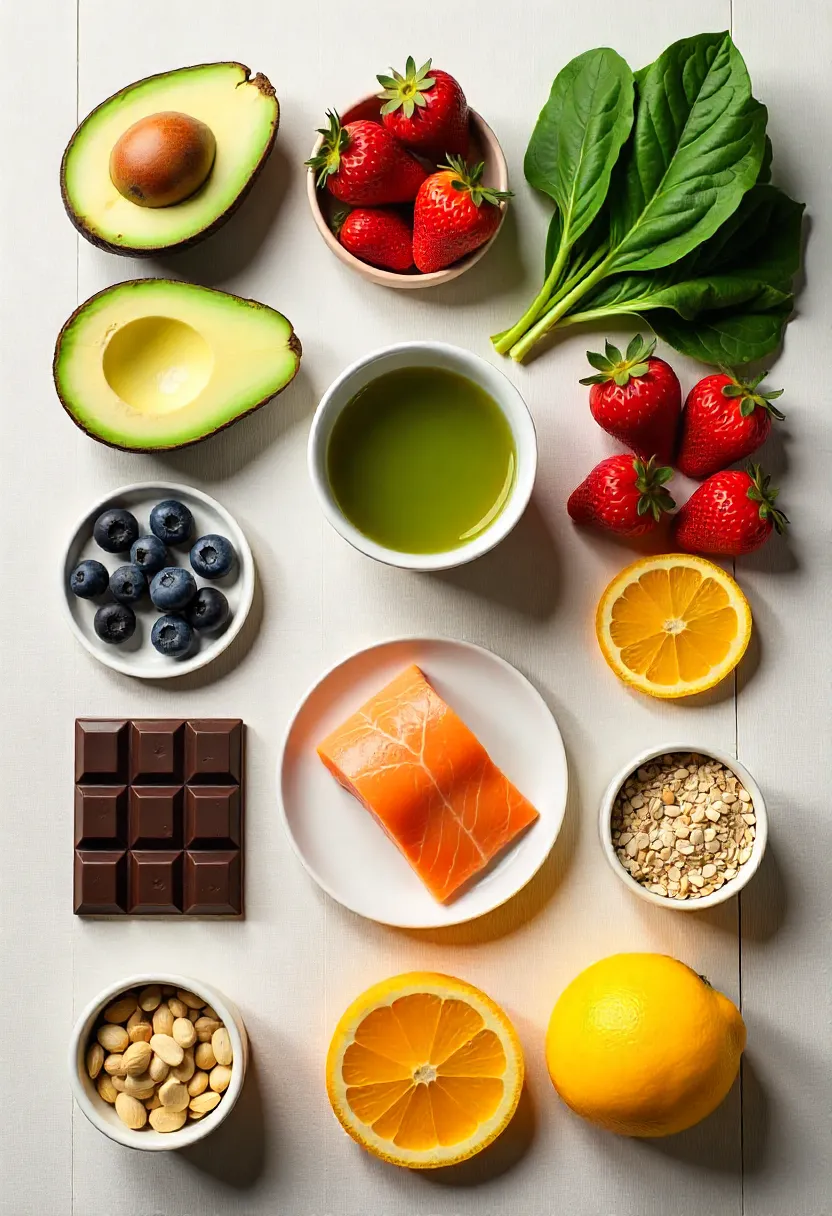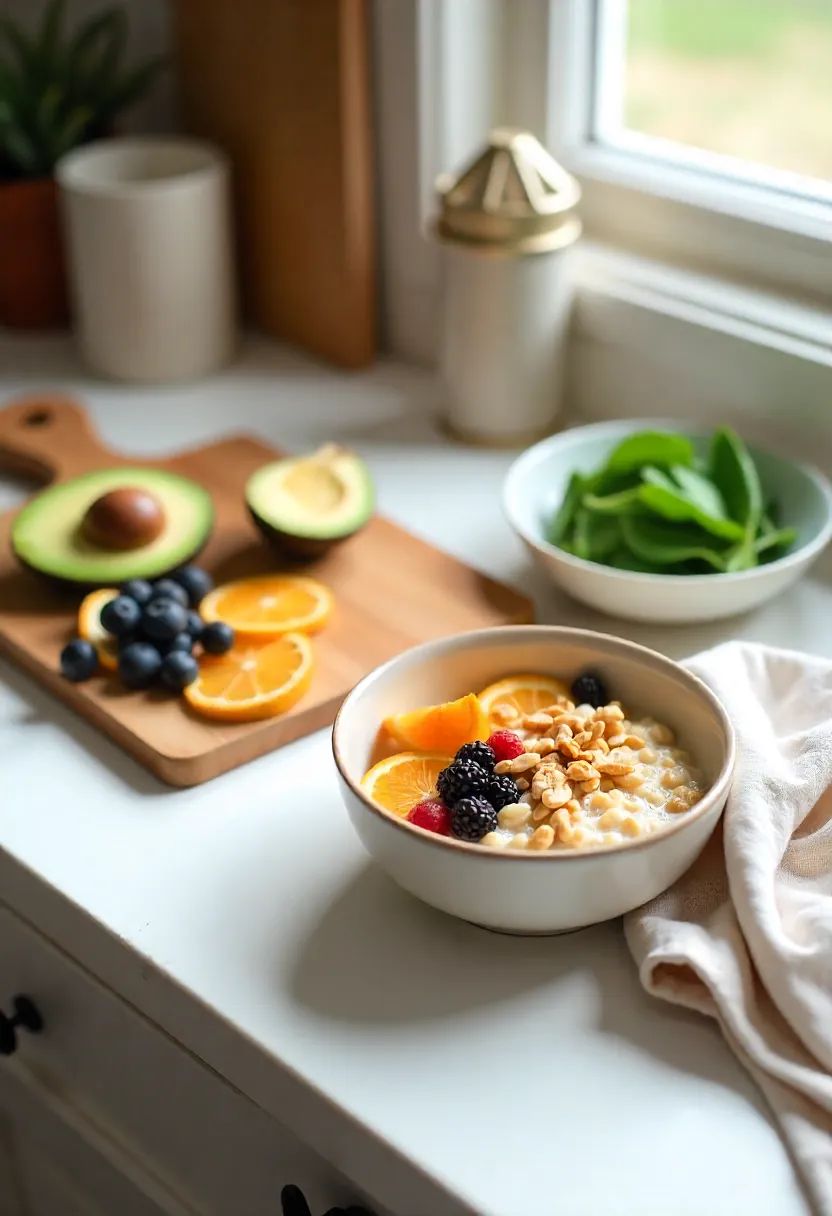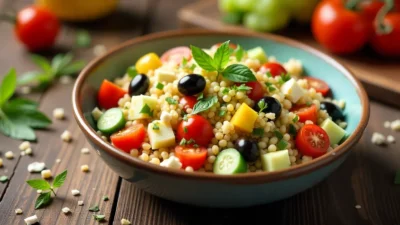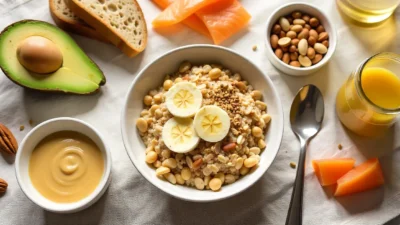Contents
Stress is part of modern life — buzzing phones, tight deadlines, endless to-do lists, late-night thinking sessions. Our bodies are wired to handle short bursts of pressure, but when stress becomes constant, a key hormone rises and stays high: cortisol.
Cortisol isn’t “bad.” In fact, it helps us wake up in the morning, supports metabolism, and keeps us alert when something urgent happens. But chronically elevated cortisol can lead to:
- Low energy and burnout
- Trouble sleeping
- Sugar cravings and weight changes
- Mood swings or irritability
- Digestive discomfort
- Foggy focus or memory dips
Not exactly the recipe for feeling grounded and well.
Food and daily habits can become powerful allies in helping your body return to calm — and that’s what this guide is all about. Inspired by research and insights from BBC Good Food’s review of cortisol-lowering foods, we’ll explore what to eat and how to live in a way that supports steadier stress hormones.
This isn’t about restriction or complicated bio-hacks.
It’s about creating gentle balance through:
🥑 calming foods
☕ mindful beverages
🌿 nourishing routines
😌 grounded lifestyle practices
Because real wellness isn’t dramatic — it’s in the simple, repeated choices that help your body exhale.
What Is Cortisol & Why It Matters
Cortisol isn’t the villain it’s often made out to be — it’s one of the most important hormones in your body. Think of it as your built-in survival alarm system. Produced by your adrenal glands, cortisol helps you:
- Wake up with energy in the morning
- Regulate blood sugar and metabolism
- Stay alert in stressful or demanding moments
- Reduce inflammation when your body needs healing
In short: without cortisol, we wouldn’t function.
The challenge comes when stress stops being temporary and turns into a daily background soundtrack. Emails that never end, sleep that never feels deep enough, caffeine used as fuel, emotions stuck in “go mode” — your brain interprets all of this as pressure, and cortisol stays elevated longer than it should.
When that happens, the body starts sending signals:
- Sleep feels shallow, or you wake feeling tired
- You crave sugar or comfort snacks
- Belly fat becomes easier to gain and harder to lose
- You feel wired but tired — jittery yet exhausted
- Focus dips, mood feels fragile, patience runs thin
This isn’t weakness — it’s biology tapping your shoulder, saying “I need support.”
The good news?
Food, movement, and daily habits can help nudge cortisol back into balance. There’s no magic ingredient, but there is a powerful everyday toolkit you can build — and that’s what we’re about to explore.
10 Foods That Can Help Lower Cortisol
Food can’t erase stress — but it can help your body respond to it more gently. Certain nutrients support the adrenal system, stabilize blood sugar, calm inflammation, and nourish the nervous system. Think of them as quiet helpers — working in the background so you feel steadier and more grounded.
Below are ten everyday foods that research (and real-world experience) connects with healthier cortisol balance.
1) Avocado
Creamy, satisfying, full of healthy fats.
Avocados support steady blood sugar and provide magnesium — a mineral linked to stress regulation and muscle relaxation. Add to toast, salads, or a smoothie for a calm, steady energy boost.
2) Dark Chocolate (70%+)
Yes, chocolate can be good for stress — in moderation.
High-cacao chocolate contains antioxidants that support mood and may help lower stress hormone levels. A square or two after lunch can feel like a moment of grounded joy, not guilt.
3) Fatty Fish (Salmon, Sardines, Trout)
Omega-3 fatty acids help manage inflammation and may support balanced cortisol and healthy mood. Pair grilled salmon with greens and lemon — simple, soothing, nourishing.
4) Berries
Blueberries, strawberries, raspberries — vibrant stress allies.
They’re rich in antioxidants that help counter oxidative stress. Keep a bowl of berries in the fridge for a sweet, cortisol-friendly snack.
5) Fermented Foods (Yogurt, Kefir, Kimchi)
Your gut and brain are deeply connected.
Fermented foods support a healthy microbiome — which in turn influences mood, stress resilience, and inflammation. Start with a spoonful a day if you’re new to them.
6) Leafy Greens
Spinach, kale, Swiss chard — magnesium and folate powerhouses.
They support nervous-system balance and energy metabolism. Add a handful of greens to soups, omelettes, or grain bowls.
7) Green Tea
Gentle caffeine + L-theanine, a natural compound that promotes calm focus.
Perfect for stressful mornings when you want clarity without the coffee jitters.
8) Citrus Fruits
Oranges, lemons, grapefruit — bright vitamin C stars.
Vitamin C has been shown to support adrenal health and cortisol balance. Even the scent of citrus can feel refreshing — try fresh lemon water in the morning.
9) Nuts & Seeds
Almonds, walnuts, pumpkin seeds, chia, flax — nutrient-dense and rich in stress-supporting minerals and healthy fats. A small handful makes a grounding snack that can smooth energy dips.
10) Oats
Slow-burning complex carbs = steady blood sugar = steadier cortisol.
A nourishing bowl of oats with berries, nuts, and cinnamon is basically a calm breakfast in a bowl.
How to Add These Foods to Your Daily Routine
Knowing which foods support calm is one thing — actually weaving them into real life is where the magic happens. The goal isn’t to overhaul your diet overnight or turn meals into a science project. It’s about simple, comforting swaps and additions that make your body feel supported rather than stressed.
Here are gentle, real-world ideas you can start today:
Start Your Morning Steady
Set the tone by choosing nourishment over rush.
- Oatmeal topped with berries, nuts & a little dark chocolate
- Greek yogurt with chia seeds, honey & citrus slices
- Avocado on whole-grain toast with lemon & a soft-boiled egg
This isn’t just about nutrients — it’s about telling your nervous system “We’re safe. We’re grounded. We’re fed.”
Sip Smart
Not every stressful moment needs coffee. Try:
- A warm mug of green tea with honey & ginger
- Warm lemon water for a bright, refreshing reset
- Evening chamomile or lavender tea to signal unwind mode
Think of your cup as a ritual — a pause, not a push.
Add Veggies Without Overthinking
Instead of chasing “perfect salads,” just add greens where you can:
- Toss spinach into eggs or soups
- Stir kale into pasta or grain bowls
- Add a small side salad with olive oil & lemon
Little scoops add up — quietly nourishing your nervous system.
Snack for Stability
Avoid the blood-sugar rollercoaster that spikes cortisol.
Easy ideas:
- Handful of almonds & fresh berries
- Kefir smoothie with cinnamon
- Dark chocolate square + walnuts
- Orange slices with pumpkin seeds
Think “protein + fiber + healthy fat” — calm fuel.
Bake Calm Into Dinner
Even comfort food can be stress-soothing:
- Baked salmon with lemon, garlic & greens
- Brown-rice bowl with avocado & roasted veggies
- Chickpea stew with turmeric & spinach
Simple, slow, warm meals feel like exhaling.
A gentle reminder…
Stress isn’t solved by one smoothie.
Well-being grows from consistency, compassion, and small daily rhythms — not perfection.
Smart Habits to Support Healthy Cortisol Levels
Nutrition is powerful — but food works even better when it lives inside a calm, supportive lifestyle. Cortisol responds to rhythm, not extremes. Your body relaxes when it knows what to expect and feels safe in the way you move, breathe, rest, and pause.
Here are gentle daily habits that help lower cortisol naturally — without turning wellness into another stress checklist 💛
Prioritize Restorative Sleep
Sleep is one of your most powerful hormonal regulators.
When sleep suffers, cortisol rises — and the cycle repeats.
Soft practices that help:
- Keep evenings calm and tech-light
- Create a bedtime ritual: warm shower, herbal tea, dim lights
- Try a 10-minute wind-down stretch or breathing routine
- Aim for regular sleep and wake times
It’s not about perfect nights — it’s about creating a safe path into rest.
Move, but Don’t Overdo It
Exercise lowers cortisol — but only when done mindfully. High-intensity workouts every day can backfire.
Balance is key:
- Brisk walks in fresh air
- Strength training 2–3× per week
- Yoga or mobility work
- Gentle morning stretching
Move in ways that feel like nourishment, not punishment.
Practice Small Moments of Stillness
Cortisol drops when your nervous system feels safe.
Try sprinkling calm throughout your day:
- 5 slow breaths before meals
- A quiet 3-minute pause mid-morning
- Step outside and feel the air on your skin
- Light music, nature sounds, or silence
Tiny pockets of peace shift your whole rhythm.
Support Your Hydration
Even mild dehydration can increase cortisol
— surprising, right?
Add gentle cues:
- Water nearby while working
- Herbal teas in the afternoon
- Lemon or mint for flavor
- Coconut water after exercise
Hydration = the simplest calm signal to the body.
Protect Your Nervous System Boundaries
Stress isn’t just internal — it’s emotional and digital too.
Daily grounding habits:
- Put your phone “to bed” before you do
- Limit doom-scrolling and news overload
- Say “no” when it protects your energy
- Keep one hobby purely for joy
You don’t need to be available to everyone, always.
A calmer life isn’t about avoiding stress — it’s about recovering from it well.
Next, we’ll talk about when stress signals may need professional support, and how to tell the difference between “a busy week” and “my body is asking for help.” 🕯️🌿
When to Seek Professional Help & What to Watch For
Sometimes stress isn’t just a season — it lingers, deepens, and begins to shape how we feel every day. Cortisol-supportive foods and gentle routines can make a meaningful difference, but there are moments when the body is asking for more structured guidance.
If you’ve been nourishing yourself, resting, moving gently, and still feel like you’re running on empty, that’s not failure — it’s information. Hormones, nervous-system patterns, thyroid function, gut health, trauma, and life circumstances can all influence stress in ways that food alone can’t untangle.
You may want to connect with a healthcare professional if you feel:
- constantly overwhelmed, even on quiet days
- tired in the morning but wired at night
- emotionally flat or unusually reactive
- ongoing digestive upset or appetite changes
- persistent brain fog or memory slips
- sleep troubles that don’t ease with routine
- anxiety or low mood that feels bigger than usual
And of course, any sudden changes like rapid weight shifts, heart palpitations, or dizziness deserve timely medical attention. These signs don’t mean something is wrong with you — they simply mean your body may need a deeper level of care.
Think of reaching out not as a last resort, but as an act of self-respect. A nutritionist, therapist, or doctor can offer tools and understanding that help you return to balance with more ease. Just as we wouldn’t hesitate to fix a broken bone, tending to stress and hormones deserves the same gentle seriousness.
You’re not meant to carry everything alone.
Sometimes the most healing choice is letting someone walk with you.
Next, we’ll wrap this all together — a reminder that calm isn’t found in perfection, but in steady, compassionate rhythm. 🌿🕊️
Conclusion — Calm Built One Choice at a Time
Stress isn’t the enemy — it’s a message.
A whisper from your body saying, “Slow down. Nourish me. Let me breathe.”
Lowering cortisol isn’t about chasing a perfect lifestyle or turning every meal into a wellness ritual. It’s about tuning into your needs, choosing foods that support steady energy, and welcoming small moments of quiet into your day. One bowl of oats, one mindful breath, one early bedtime at a time — little choices add up.
Those choices create a life where your nervous system feels safe.
Where you wake up with a softer mind, a calmer pulse, and a body that trusts you.
A smoothie won’t erase stress — but the way you care for yourself can transform how you carry it. Let food be grounding, let routines be gentle, let rest be real. And remember: you don’t have to earn peace with hustle. You’re already worthy of slowing down, breathing deeply, and feeling whole.











Way cool! Some extremely valid points! I appreciate you
penning this post and the rest of the website is also really good.